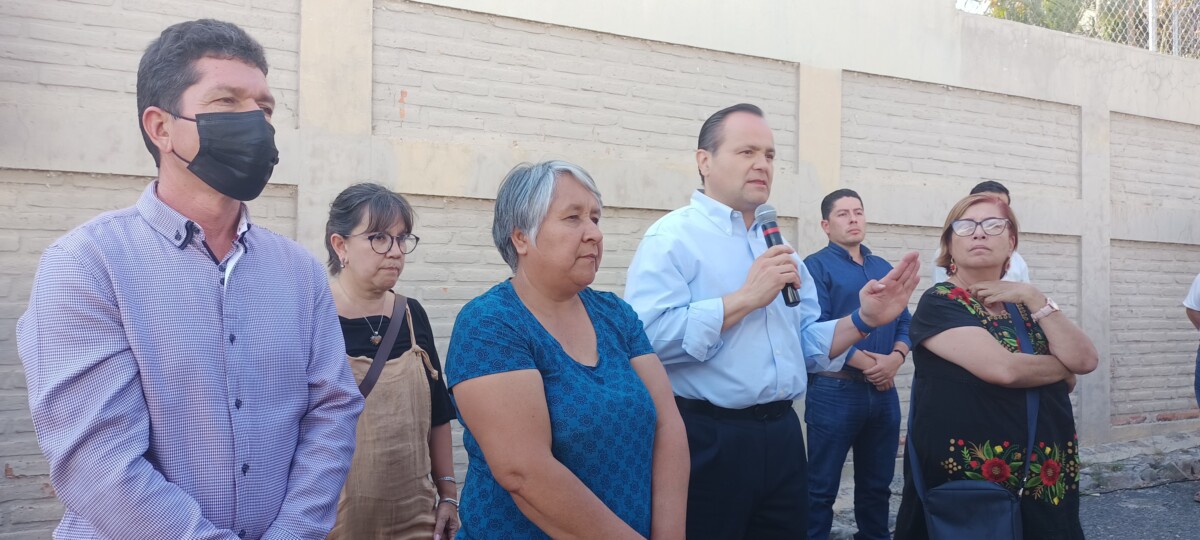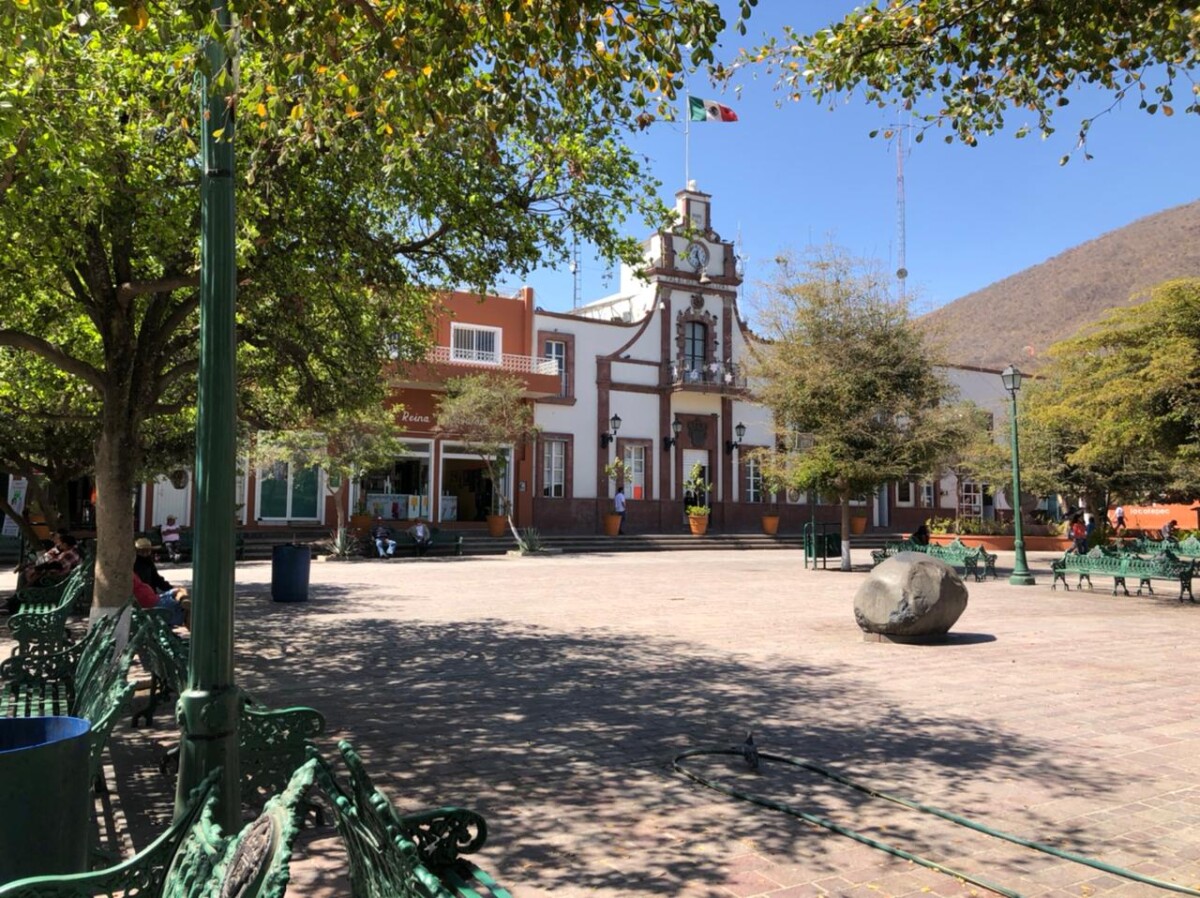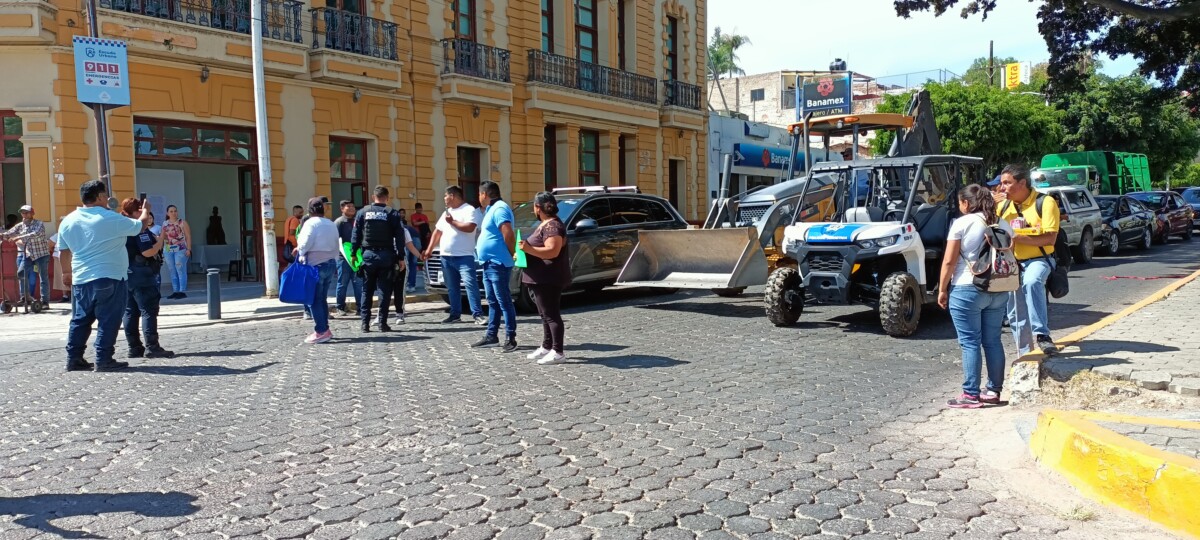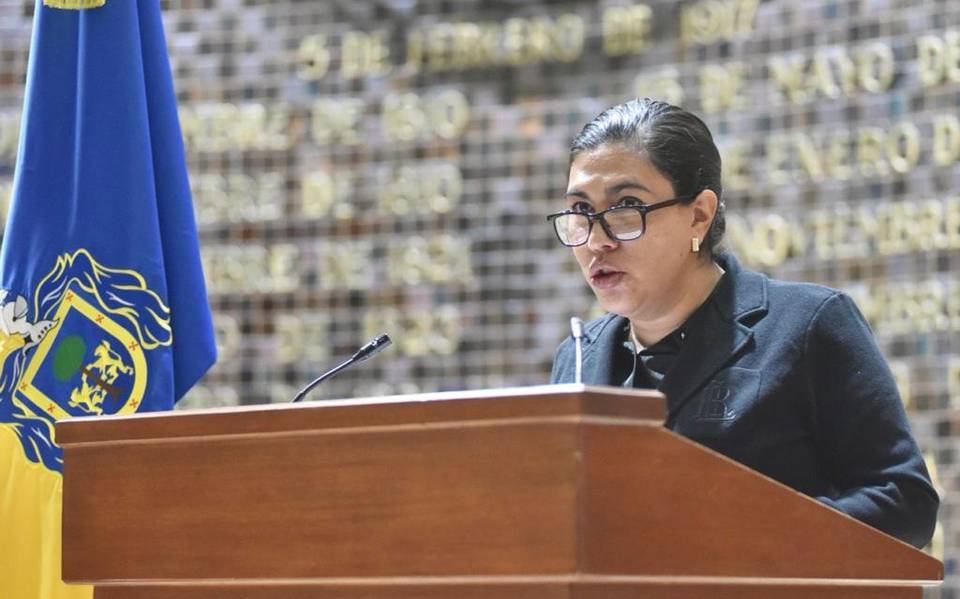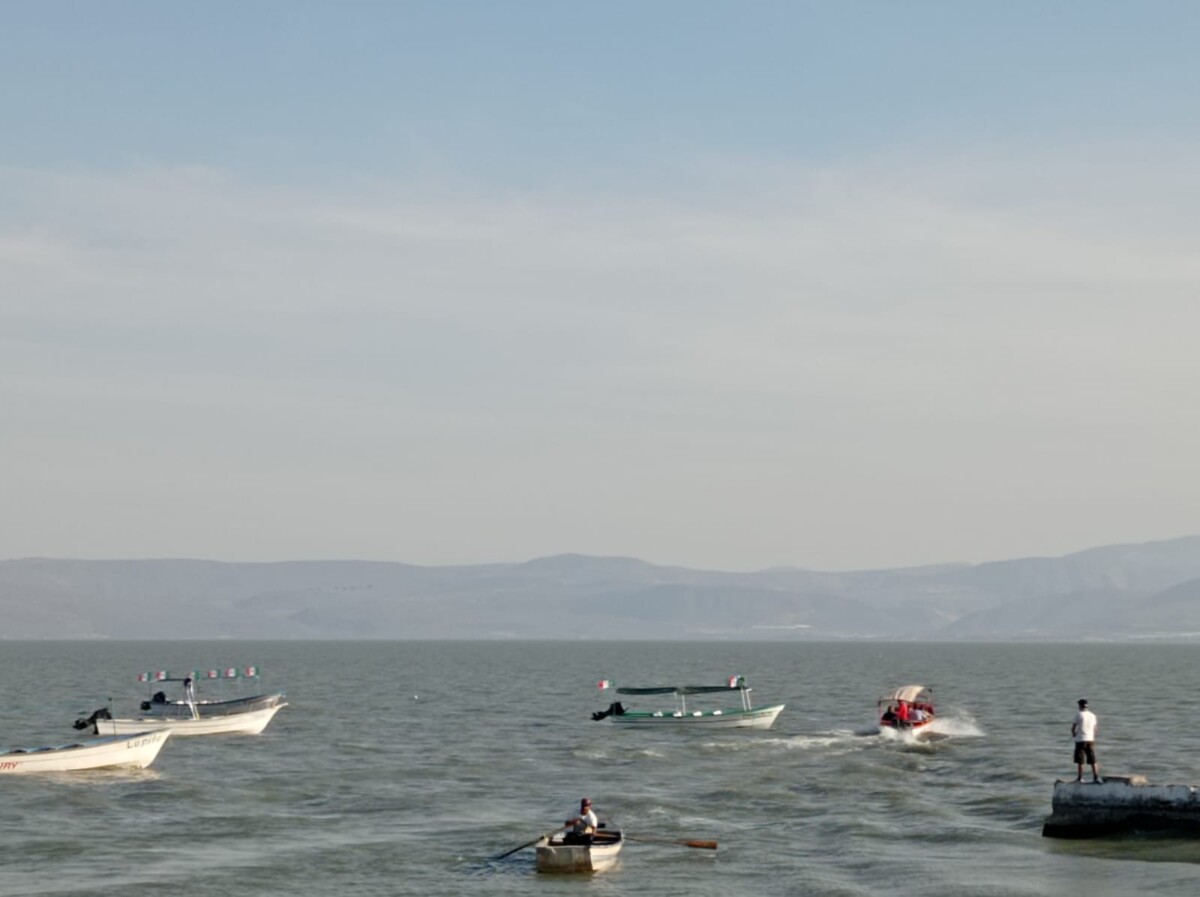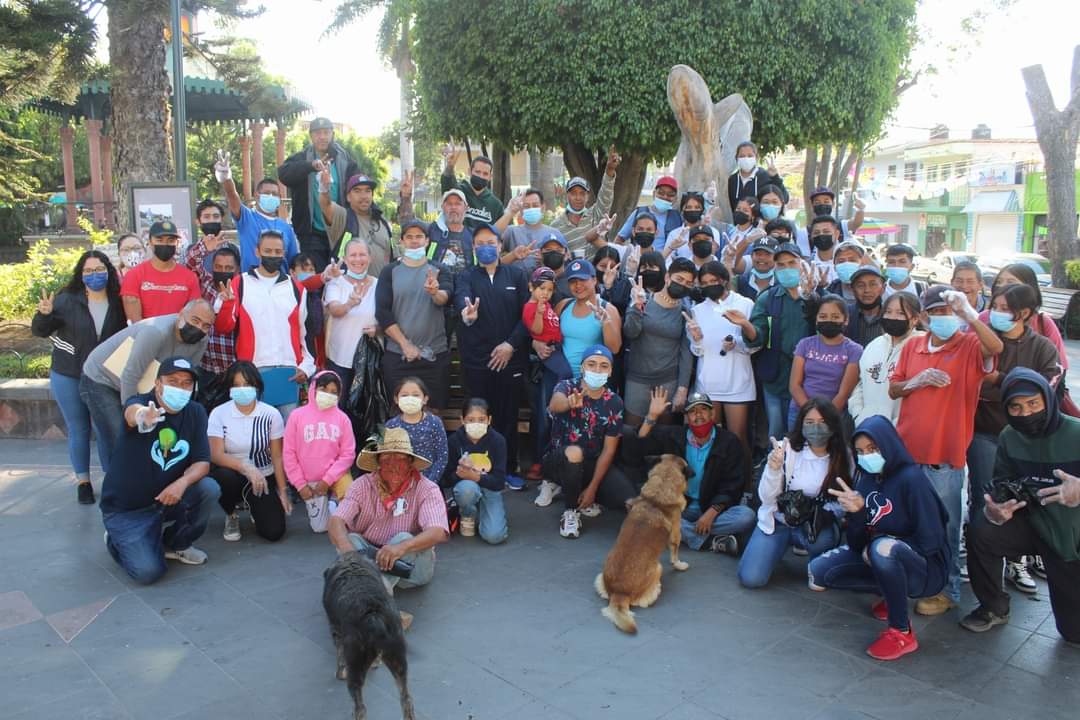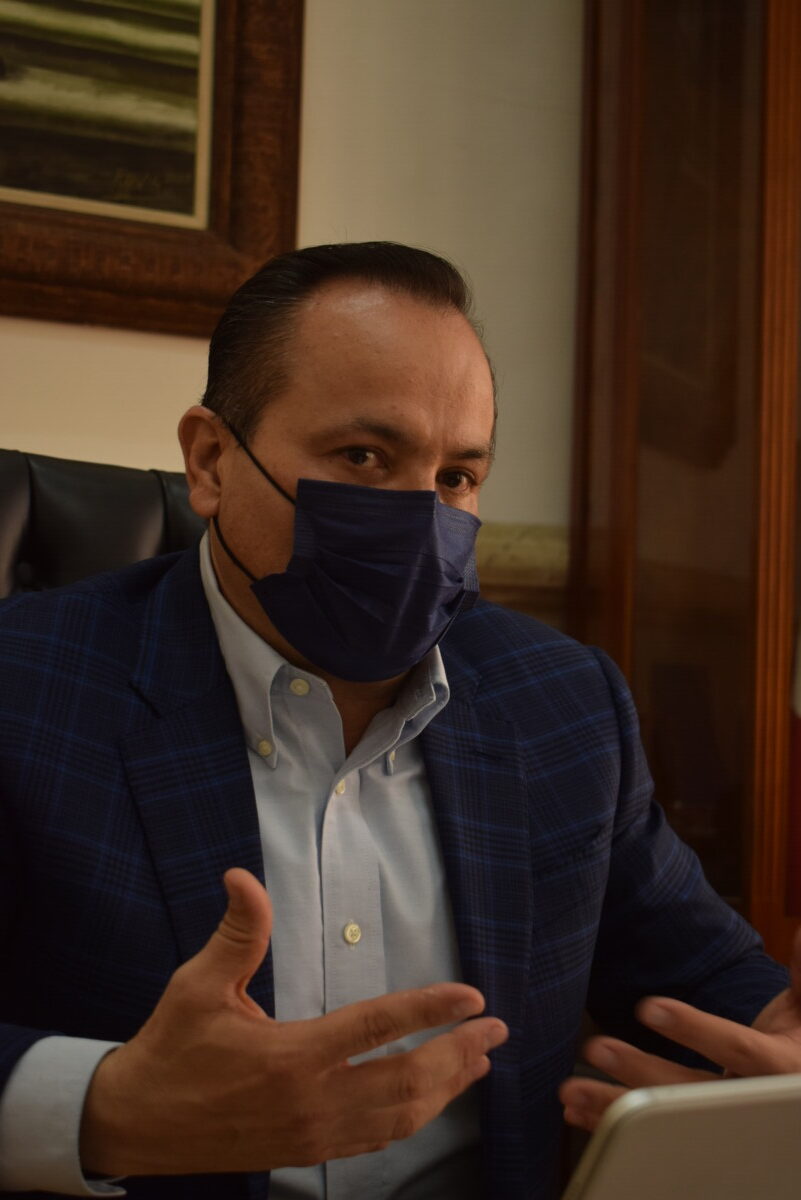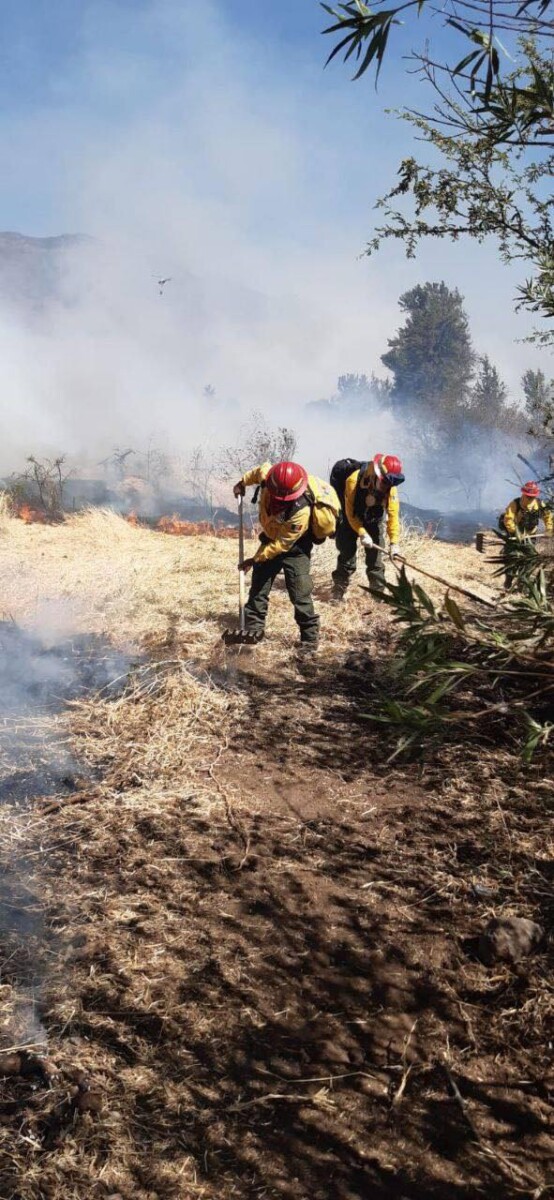Localidades
Chapala’s City Hall presents major water treatment and drainage project for Riberas del Pilar
Chapala Municipal president, Alejandro de Jesús Aguirre Curiel, with microphone in hand, the municipal agent Ana María Huerta Rivera, the councilman of Riberas del Pilar, Jesús González Amezcua, and two of the members of the new neighborhood committees.
Jazmín Stengel (Chapala).– The Chapala City Council presented a project for the installation of a sewage system to benefit the population of the Riberas del Pilar. The work is estimated to cost 68 million pesos, to be paid in equal parts by the municipal government and by residents. The Council claims that the properties that currently have private septic systems are contaminating the environment and the project is needed.
After introducing Ana María Huerta Rivera as agent for Riberas del Pilar, and asking the residents to watch for increasing shoreline invasions of federal zones, President Alejandro de Jesús Aguirre Curiel, presented the details of the project.
«This is a proposal, which consists of installing much-needed drainage. It also includes a water treatment plant. We have to do this together, the municipal government and each one of the taxpayers.» He added that the proposal has been reviewed for feasibility.
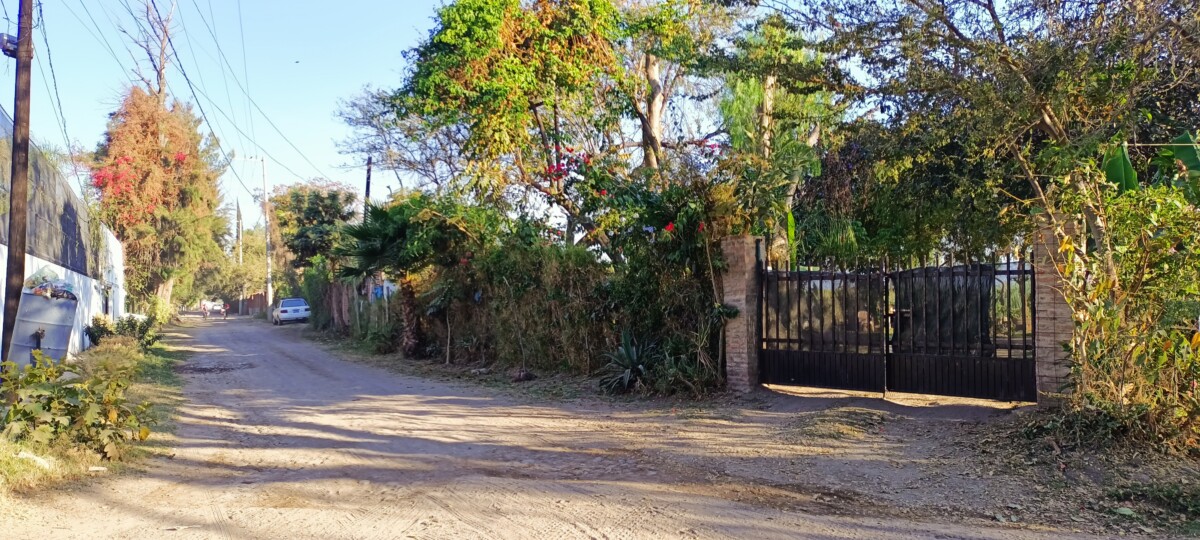
The plant would be built on Paseo del Lago street, on the corner of San Mateo towards San Lucas street, in the Riberas del Pilar municipal agency. Credit: Jazmín Stengel.
The project, presented on April 5, includes drainage lines, a modular treatment plant which would be located between San Lucas and San Mateo streets on the shores of the lake, and the connector. It would be built out in one single six-month stage.
The current municipal administration asked residents to agree to the 50/50 cost split. Cost-sharing is necessary as there is not any available support from federal or state programs. In addition, officials said that they need 25% of the total cost of the project in advance to start the work. Residents have about 45 days to contribute the first 17 million pesos. If the funds are not raised, they will be returned to those who have contributed. The deadline was established by the approximately fifty residents present at the meeting. Government representatives assured that they had 34 million pesos available for the project.
In order to collect the remaining 34 million pesos from Riberas del Pilar residents, each homeowner will be charged 70 pesos per square meter of land, business owners will be charged 100 pesos per square meter. Riberas del Pilar covers 237 hectares, and contains about registered 1,500 properties.
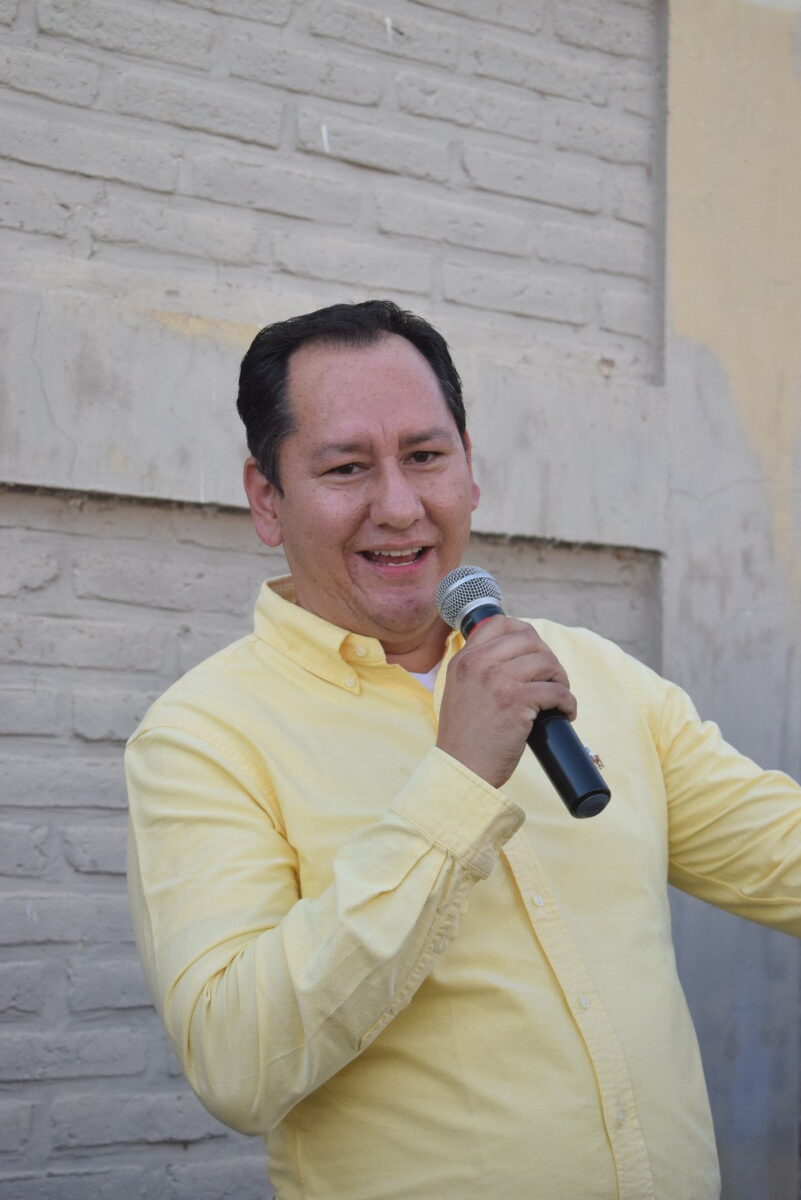
Fernando Antonio Monreal Mendoza, engineer in charge of the work and director of the Municipal Potable Water and Sewage System (SIMAPA).
There will be two ways to quote the fee and make the corresponding payment. The first is bring your property deed Municipal Water and Sewage System (SIMAPA) office, located in the new administrative unit located 62 Hidalgo Avenue. The second option is to wait for the formation of one of four neighborhood committees that are expected to be formed.
Connections from the houses to the public sewage system are not included in the cost of the project, or in the fees collected. Homeowners and business owners will be responsible for their own costs to connect to the system. Current estimates are 14,000 – 18,000 pesos per house. Officials said that anyone who does not pay the required fees for the project will not have the right to connect to the public drainage, and will be fined in the future for environmental contamination.
Present for a short time during the meeting were the municipal president Alejandro de Jesús Aguirre Curiel, the director of the Municipal Potable Water and Sewage System (SIMAPA) Fernando Antonio Monreal Mendoza, Juan Carlos Pelayo, advisor to the City Council, as well as council members, and the recently-appointed delegado, Ana María Huerta Rivera.
Translated by Amy Esperanto
Despite ‘no budget’ Jocotepec’s City Hall payroll increases
Last year, the Government of Jocotepec registered a total of 547 civil servants. Photo: File.
Héctor Ruiz Mejía (Jocotepec).- Despite the fact that authorities claim that the municipality of Jocotepec has a limited budget, during the last four years the number of City Hall workers increased from 398 to 547.
According to a report issued by the Tax Administration Service (SAT) under folio number 22NA4165087, corresponding to fiscal years 2018 to 2021, the municipality increased its workforce by 37.43% during that period.
Although in daily discourse, the municipal president of Jocotepec, José Miguel Gómez López, states that Jocotepec has little budget, the information obtained through transparency shows the opposite.
In 2018 City Hall had 398 workers; this increased to 540 in 2019 and dropped to 534 in 2020. In 2021, 547 City Hall workers were on the payroll.
Total salaries and wages of civil servants as reported increased the budget by 25.17%.
In 2018, the municipality of Jocotepec paid a total of 52,560,210.72 pesos (about US$2.6 million); in 2019 the amount was 56,743,975.04 pesos (about US$2.8 million). In 2020 it increased to 67,505,644 pesos (about US$3.3 million).
2021 closed with a payroll expense of 65,789,990 pesos (about US$3.28 million) together with a section of salary exempt payments of 3,143,411 pesos (about US$157,000) totaling 68,933,401 pesos (about US$3.44 million).
After the cutback of federal funds, the municipal president reduced the salaries of councilmen 50% and salaries of employees in positions of trust 30 percent as a cost saving measure. Despite these reductions to payroll, 2021 was the year in which the most money was spent on salaries.
Translated by Nita Rudy
Jocotepec restaurants expect profitable tourism in Easter Week
The approximately 14 restaurants that make up the area known as Piedra Barrenada expect a large influx of tourists during Easter Week. Photo: Héctor Ruiz.
Héctor Ruiz Mejía (Jocotepec).- Jocotepec expects a major influx of tourists during Easter Week, with a concomitant increase in economic revenue. The 14 restaurants of the tourist – gastronomic zone of San Juan Cosalá known as Piedra Barrenada, located in San Juan Cosalá, are preparing for a return to “normal” after a drop of approximately 75 percent in sales during last year’s holiday season.
According to Víctor Manuel Loza Ornelas, director of Tourism and Artisan Promotion, after two years of a complicated panorama in the sector due to the pandemic, this year more than 18,000 visitors are expected during Easter Week. Loza Ornelas stated that the economic revenue expected is approximately 4 million pesos per week (about US$200,000), or 8,000,000 pesos in total during the vacation season (about US$400,000). This is double the 2,000,000 pesos that are normally generated per week. «The economic revenue in a bad season, let’s say, goes above two million pesos, but in this season that amount doubles», he said.
Saulo Rameño Castañeda, manager of the 42-year-old Bar Piedra Barrenada Restaurant, is also optimistic. «The truth is that the last two years were very complicated. Although we were open last year, we did not take in what we expected. I estimate that there was a 50 percent decrease in sales. However, the outlook for this year is favorable,» he said. The businessman added that during the Holy Days this year, they will open longer hours, from 8 am. to 8 pm. In this busiest time of the year, they host up to 600 diners per day.
The year that had the greatest impact on the drop in sales was 2020, when health authorities forced businesses to close their doors for a month due to the sanitary contingency.
Translated by Elisabeth Shields
Over 100 students graduate at the Octavio Paz University Campus (CUOP)
Students receiving diplomas and certificates at Octavio Paz University Campus
Redaction.- Octavio Paz University Campus (CUOP) held the solemn graduation ceremony for high school and undergraduate students on March 30.
More than one hundred students graduated from CUOP’s high school level along with students completing their undergraduate level degrees.
CUOP educational programs and certifications are endorsed by the Ministry of Education of Jalisco (SEJ), University of Guadalajara (UdeG), Ministry of Public Education (SEP), Ministry of Labor and Social Welfare (STPS), Ministry of Communications and Transportation (SCT), as well as the Federal Civil Aviation Agency (AFAC).
CUOP received recent distinction when students Leonardo Gael Aldanda placed first, and Leonardo Gibrán placed second in the LIMATEJ Mathematical Tournament organized by the SEJ.
CUOP students also distinguish themselves in sports. At the last volleyball tournament organized by COMUDE Chapala. The high school team won third place at its level, while the middle school (secundaria) team won first place in the competition.
For information about registration: 376 765-3355 and 331 843-4380.
Translated by Nita Rudy
Indigenous street vendors evicted in Chapala and block Madero Avenue to protest
About 50 merchants protest on Francisco I. Madero avenue after the stall and its merchandise was seized. Credit: Jazmín Stengel.
Jazmín Stengel (Chapala).– Street merchants were evicted, and their merchandise confiscated by the Department of Regulations, Registration and Licenses, near the recently restored area of the Chapala boardwalk. They protested on Francisco I. Madero Avenue, at the intersection with Hidalgo, on Saturday, April 2.
The Triqui merchants are from Oaxaca. After having been relocated several times in the last month by the authorities (due to restoration of green space, and new urban image policies going into effect) they refused to move again. They had been asked to relocate to the east side of the boardwalk, in the parking lot of the restaurant area known as La Rampa. They were joined by ten other local merchants.
As a result, agents of the Department of Regulations, Registration and Licenses immediately confiscated a street stall on the Chapala boardwalk, using public security personnel; they denounced the Oaxaca Triqui merchants in the area.
On Monday, April 4, a dialogue was scheduled with the authorities during working hours. Up to that time ten stalls had been allowed to continue working in the locations already registered, since the owners had a valid commercial permit. However, on Saturday, April 2, shortly after noon, inspectors accompanied by public security came to confiscate the merchandise from the first street stall, without having given prior official written notice, according to testimonies of the indigenous merchants. The stall had been there for thirty years.

Merchants and municipal authorities struggled during the seizure of merchandise. Credit: Special.
The agents involved refused to identify themselves, answering «oi este wey (I heard this guy).» As they moved on to other stalls, merchants struggled to defend their product and labor rights. One video of such an interaction went viral on social networks. «They take things away like vile thieves,» said one of the affected merchants on the video. In one of the multiple videos published by the Triqui Merchant Guild of Oaxaca, one can observe the struggle between merchants, officials, and public security. «Three men pulled me,» said a minor involved. A Triqui woman was bruised after the struggle.
The aggressions on both sides escalated when the merchants demanded that a count of the confiscated merchandise be made public. However, the product was taken to City Hall facilities, resulting in a blockade by about fifty protesters at the intersection of Francisco I. Madero Avenue and Hidalgo Avenue. The Triqui Merchant Guild said they are organizing to demand their human rights, labor rights, and the reimbursement of the affected merchandise. They have multiple options including a human rights complaint, a legal claim, or a commercial injunction to avoid being removed and discriminated against.
As of the closing of this edition, the affected parties were attended by the municipal president, and were informed that the count of the merchandise was finished. However, municipal president Alejandro Aguirre asked those present to keep the boardwalk free of street commerce during the upcoming Holy Week and Easter vacations. This does not solve the relocation problem for the indigenous merchants.
Translated by Amy Esperanto
In ‘act of congruence,’ Congresswoman Maria Dolores Lopez Jara promotes sexual diversity reforms
District 17 Deputy Maria Dolores Lopez Jara. Photo: El Occidental.
Redaction.- District 17 Deputy Maria Dolores Lopez Jara said she was in favor of the package of legal amendments to recognize equal marriage, gender identity and the prohibition of conversion therapies.
From the tribune of the Congress of Jalisco, the legislator from Jocotepec defended initiatives aimed at recognition of LGTBTTIQ+ community rights. López Jara stressed that the law should not support privileges for one group of people over another.
“In this country there are no first- and second-class people,” she said. “Human dignity is what counts. Our value is in how human we are – how good or wrong we are, not for what we prefer or what we like. To put it simply, human dignity is not bargained. I insist – there are no first- or second-class people,” she emphasized.
Saying that even if it represents her “political tomb,” López Jara defended human rights over political repercussions, as an act of congruence with her person and her family.
“I don’t know what legacy you want to leave,” she said with emotion. “I just want to leave a legacy for my daughter, and that is called congruence. I want to tell you – neither my love nor my family is less worthy than yours, yours or yours.”
The three initiatives were approved by the local Congress on Thursday, April 7, in a session that lasted until the wee hours of the morning.
Translated by Mike Rogers
Gabriel Vásquez Sánchez appointed state representative in the State Council of Natural Protected Areas
In Jalisco, 971,334.15 hectares–about 3,750 square miles–are under some conservation agency, including thirteen Ramsar sites, such as Lake Chapala. Credit: D. Arturo Ortega.
Editor. – The director of the Intermunicipal Association for the Protection of the Environment and Sustainable Development of Lake Chapala (Aipromades), Gabriel Vásquez Sánchez, was appointed state representative in the State Council of Natural Protected Areas (ANP). He was installed by the Ministry of Environment and Territorial Development (Semadet) last week.
The Council was installed as part of the implementation of the State Program of ANP and Other Conservation Instruments (OIC). These organizations and programs aim to improve ecosystem management, and prioritize the recovery and maintenance of environmental services and their sustainable use. They will support Semadet with expert advice, recommendations for environmental policies, and decision making.
Expert collaborators Eduardo Santana Castellón and Ernesto Sánchez Proal, as well as representatives of the advisory councils of the Sierra del Águila, the Mesophilic Forests and the Cerro Viejo – Chapinaya – Los Sabinos are also participating. The installation of the State Council of PNAs (Protected Natural Areas) and ICOs is made up of representatives from Semadet, the State Attorney’s Office for Environmental Protection (Proepa), the Jalisco Secretary of Rural Development (Sader), the Secretary of Tourism (SecturJal), the National Commission of Natural Protected Areas (Conanp), the National Forestry Commission (Conafor), the University of Guadalajara (UdeG), the Northwest Fund (Fonnor A. C.), the State Livestock Unit, the Forestry Union, and the Chamber of Tourism.
Javier Sampayo Lazcano, director of the Decentralized Public Organization (OPD) Sierra de Quila, will represent the Federal Areas, and Gabriel Vásquez Sánchez, director of the Intermunicipal Association for Environmental Protection and Sustainable Development of Lake Chapala (Aipromades), will represent the State Areas. Expert collaborators Eduardo Santana Castellón and Ernesto Sánchez Proal also participated, as well as representatives of the advisory councils of the Sierra del Águila, the Mesophilic Forests and Cerro Viejo – Chapinaya – Los Sabinos.
During the session, Fonnor A.C. was appointed as representative to the State Biodiversity Committee (CEB), a body that monitors and coordinates the execution of the actions established in the Jalisco State Biodiversity Strategy (EEB-Jal). In Jalisco, 971,334.15 hectares are under some kind of conservation agency, including eleven federal PNAs, eight state PNAs, and eight municipal PNAs. There are also two state Environmental Recovery Zones (ZRA) and one municipal PNA. There are thirteen Ramsar sites (wetland sites designated to be of international importance under Ramsar Convention on Wetlands)and seven Areas Voluntarily Designated for Conservation (ADVC).
Resources for more information:
The State Program of ANP and OIC:
Information about modification to the LEEEPA:
https://gobjal.mx/ReglamentoLEEEPAanp
Translated by Amy Esperanto
New Ajijic street cleaning program
Attendees of the first garbage collection program. Photo: Alejandro Aguirre Curiel
Sofia Medeles (Ajijic).- A new clean-up program started in Ajijic on April 2nd. Dozens of young people, children and municipal authorities participated in the cleaning of several streets in the downtown area.
On this occasion, students from the Centro de Estudios Técnicos en Aguas Continentales (CETAC) were invited to support the program. The person in charge of the program, Maximiano Macias Arceo, said that at least 12 children joined in the cleanup. Also present were the municipal president of Chapala, Alejandro de Jesús Aguirre Curiel; the councilwoman of the delegation, Denisse Michelle Ibarra; the municipal trustee, Gamaliel Soto Pérez; and other workers of the delegation.
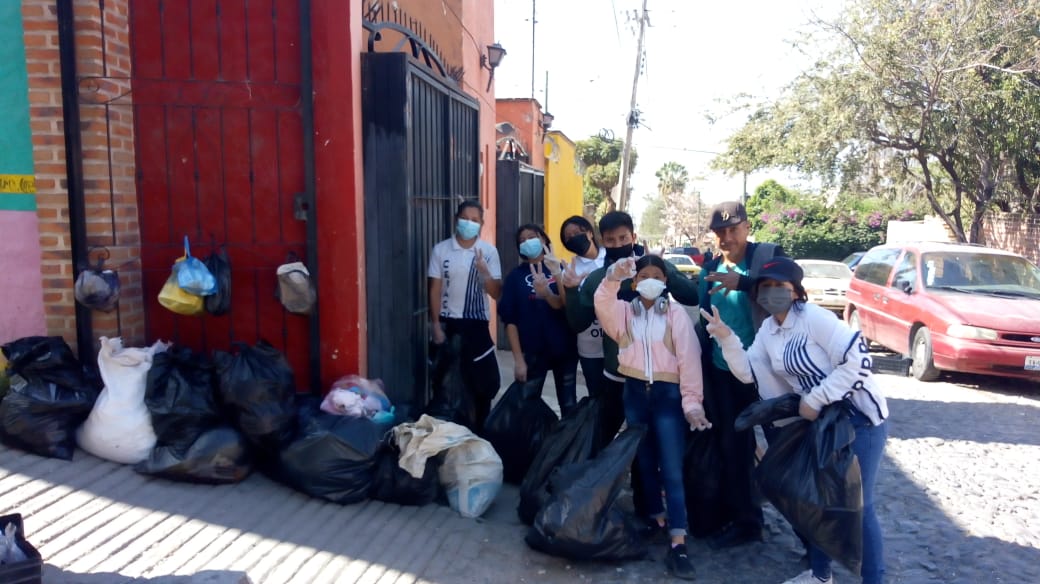
Young people during the garbage collection in the streets of Ajijic. Photo: Maximiano Macias Arceo
The students who attended were provided with refreshments donated by several people, including Ajijic councilwoman Denisse Michelle Ibarra, trustee Gamaliel Soto Pérez and a member of the group Unidos por Ajijic (United for Ajijic). Stickers for trash cans and waste containers were also provided.
Although Macías Arceo was pleased that the work session had gone well, he said that both he and the participants were saddened that again there was garbage in the streets after the cleaning brigade.
«During the tour, some people said that they remembered the work of Juanita, ‘La Japonesa,’ (a devoted member of CASA, of the Lake Chapala Garden Club, the Lakeside Garden Guild, the LCS, and of other civic-minded organizations who taught and worked with local children to beautify Lakeside) and hoped that we can achieve similar results. We want to revive that culture of cleanliness and control of garbage in the streets», he added.
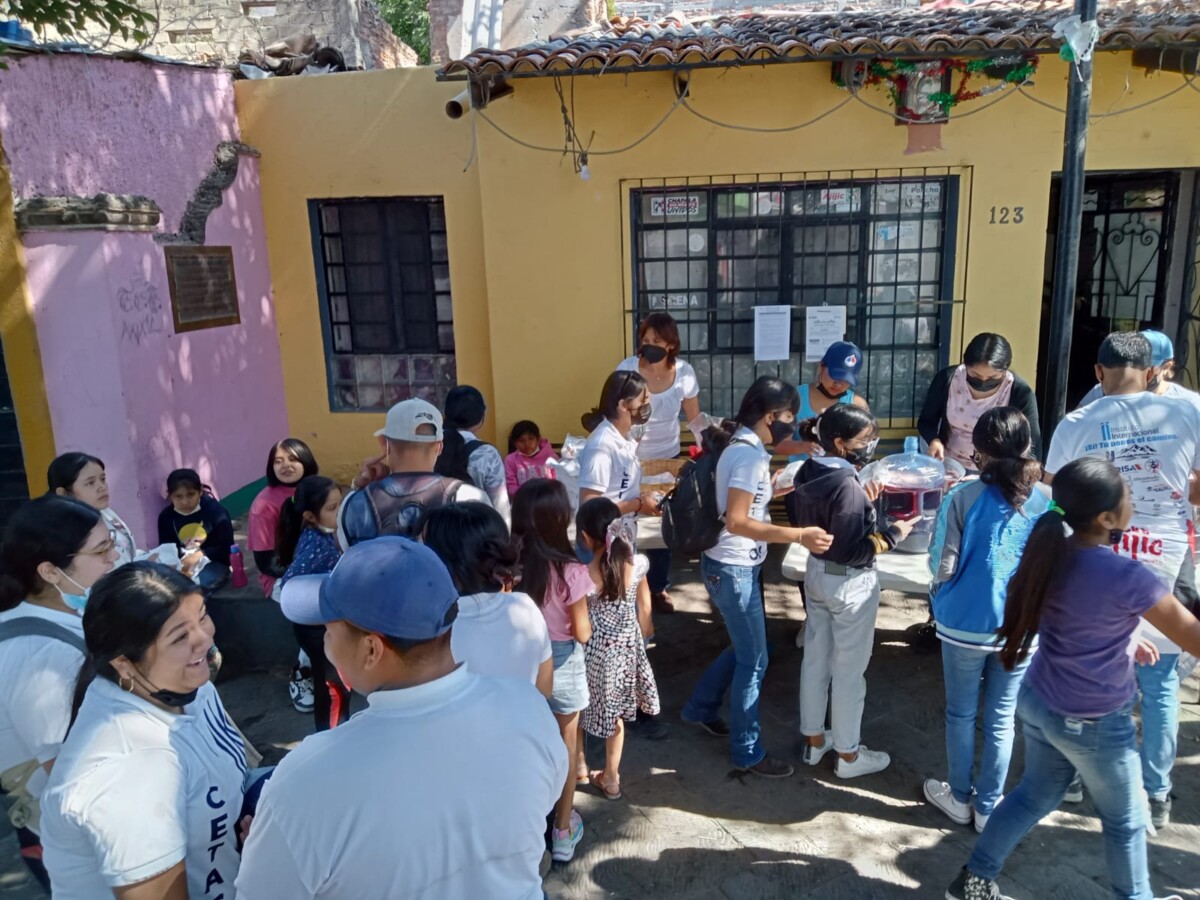
Children receiving snacks donated by public officials. Photo: Maximiano Macias Arceo
Macías Arceo said both donations and volunteers are welcome for future work sessions. The dates will be announced several days in advance on the Facebook page «Delegación Ajijic 2021-2024» and in local media. «The next date will be after Easter vacation. We will invite more schools to cooperate, whether public or private, because we want everyone to become aware and participate in cleaning the streets,» stated Macías Arceo.
Translated by Elisabeth Shields
PHOTONOTE:
The municipal president of Chapala during an interview with Semanario Laguna.
Redaction.- The president of Chapala, Alejandro de Jesús Aguirre Curiel, was appointed vice-president of liaison with the Judicial Power of the National Association of Municipalities and Mayors, A.C. (ANAC), in Mexico City on March 11 of this year.
With this, «benefits will also be generated for our municipality of Chapala, because the commitment of PAN governments is with families; in addressing the needs and problems, thinking about a better course for Jalisco and Mexico,» he posted on his Facebook account.
Translated by Sandy Britton
PHOTONOTE:
Héctor Ruiz Mejía (Jocotepec).- On March 30, a non-forest fire alarm was triggered in the area known as La Playa in Huejotitán, municipality of Jocotepec.
Extinguishing the fire required the coordinated work of 66 elements of the Ministry of Environment and Territorial Development (SEMADET), the National Forestry Commission (CONAFOR), as well as the Civil Protection and Firefighter Unit (UPCB) Jocotepec and the Government of Tlajomulco de Zúñiga.
Translated by Sandy Britton
© 2016. Todos los derechos reservados. Semanario de la Ribera de Chapala
